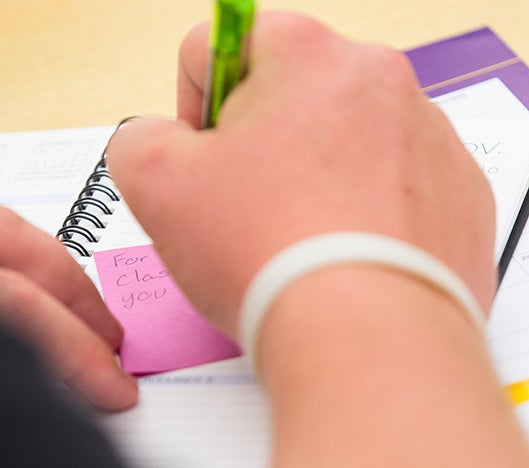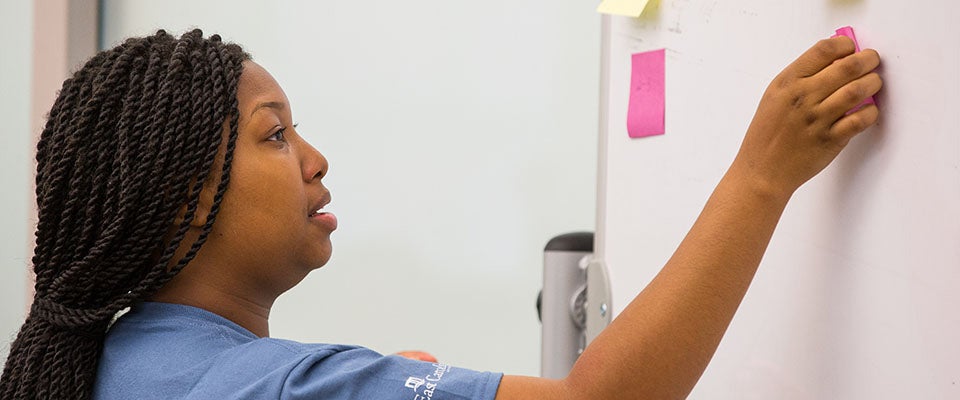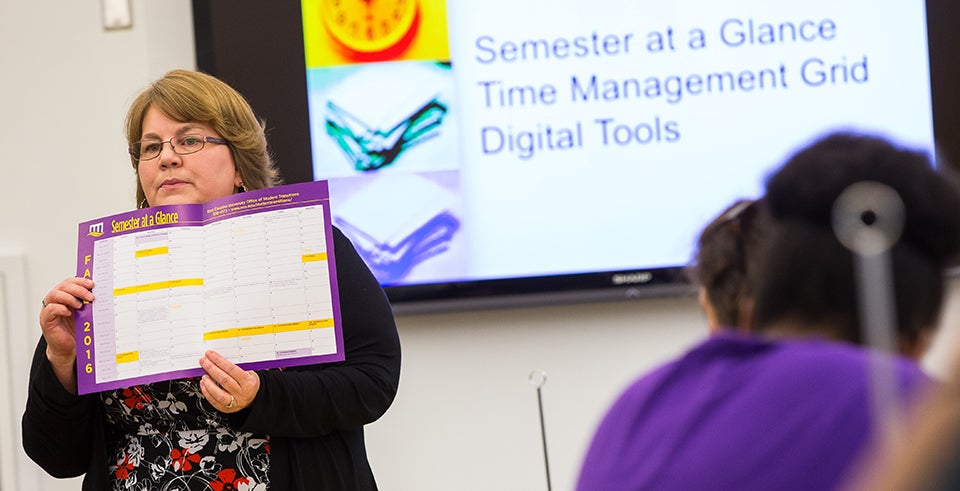HITTING THE BOARDS
REBOUND program gives struggling students a boost
East Carolina University offers a range of programs and services aimed at helping its students stay in school and ultimately graduate, and a new program is helping students bounce back from a disappointing first year.
“The REBOUND program is for students going into their second year who were not happy with how they did their first year,” said Jayne Geissler, executive director of retention programs and undergraduate studies. “They’re here because they want to do better.”
For the university, it’s an opportunity to improve on retention and graduation rates. Last year, just over 80 percent of the freshman class returned, and the six-year graduation rate was 62 percent. Each of those numbers is slightly lower than the UNC system average.
However, ECU’s graduation rates have been trending upward, and the retention rate after the first year has been over 80 percent in five of the last six years after hovering in the mid- and upper 70s for the decade prior.
Over the summer, 650 students received letters inviting them to participate in the REBOUND program, which provides support to identify individual learning styles and appropriate studying strategies, sets GPA goals for the semester and beyond, connects students with tutoring, mentoring, major and career counseling, and offers workshops prior to the start of classes and throughout the year.
“The letter was just to say, ‘we do have a lifeline for you, if you want to come back and try again,’ ” Geissler said.
Eighty-two students reported to campus a few days early to participate in a two-day series of workshops.
“Any student that we help, we feel like it’s worth our time,” said Kelly Reddick, academic advisor. “Having 82 participate was a huge success to me.”
The REBOUND program coincides with a change in rules that began with 2015’s freshman class, allowing three semesters rather than two before struggling students are suspended for a semester.
“For the first time, students who have done poorly for two semesters have the opportunity to return in the fall,” Geissler said. The idea for the program came from a similar initiative at Middle Tennessee State University.
It connects each student with an advisor — many of the students felt the need to have someone checking in on them, Geissler said. The workshops were conducted by team members from Career Services, the Pirate Academic Success Center and the Center for Counseling and Student Development, as well as faculty.
“They were assigned the mentors before the workshop, and we reached out by phone, by email, talking to the students and trying to initiate that conversation before they got here so they’d already feel comfortable,” Reddick said. “In our small groups we would give the learning style assessment, and then we’d have sessions specifically for that learning style.
“Throughout the fall we will continue to work with them at least twice a month via small group, emails, phone calls, just to keep in contact.”
The success of the program, Geissler said, will ultimately be measured by whether the students are staying, whether they’re successful and how they do their first semester back this fall.
“I was a rebound student myself way back when, and I want our REBOUND students to know that our university cares about them and they are not alone in their efforts to improve their academic performance,” said provost Dr. Ron Mitchelson. “We have tremendous resources for students at ECU and we want them to take full advantage of them. Sometimes they have trouble asking for help.”

A REBOUND student takes notes.
While REBOUND is aimed at students who have only attended for one year, another program is intended to help those who have spent several years in school but aren’t quite on track for a degree. The Bachelor of Science in University Studies was instituted two years ago to help students who have 90 credit hours or more but no degree in sight.
“We work with students with a variety of situations, some have hit roadblocks, and they may have a lot of hours but haven’t made enough progress toward a particular major,” said Stephanie Bailey, assistant director of the university studies program. “So we look at all their credits from ECU and other institutions … and we’re able to look at what they have in common, what themes may emerge, and more importantly, what these students want to do as far as a career goal.
“Then we see if we can … create a unique individualized interdisciplinary degree,” she said.
The students take an introductory course during which they create a proposal for their degree program and what they hope to accomplish. A faculty oversight committee helps ensure that the university studies degrees do not replicate or take away from existing traditional degrees.
“It’s a really interesting, creative, focused process,” Bailey said, “and hopefully in two semesters … they can graduate.”
Amy Lee was a family community services major prior to leaving ECU for personal and financial reasons in 2008. She then held a variety of jobs, including after-school programs in low-performing schools and non-profit organizations helping homeless individuals.
She had always wanted to complete a degree, Bailey said, and through the BSUS program she created a degree based on entrepreneurship, a child development minor and health-related classes. She received her degree in May 2015 and is now working toward a master’s degree in child development.
In her proposal for the BSUS program, Lee said, “My career goal is to construct a non-profit organization, designed for community outreach, after-school programs, enrichment activities for at-risk youth, healthy living and counseling services. My desire to provide these extensive outreach programs, I feel requires an interdisciplinary application of knowledge and skills, which I have gained from various classes during my time at ECU.
“After graduating with a university studies degree, I will work towards earning a master’s degree in a program that will enable me to successfully operate and sustain the non-profit organization I want to build from the ground up.”
The bottom line, Geissler said, is that ECU wants its students to maximize their time at the university, completing their degrees “effectively, efficiently and affordably.”
“We have a ton of student support services,” she said. “Our tutoring center now tutors about 25 percent of the entire undergraduate population — about 5,000 students a year out of about 21,000 undergraduates.”
The REBOUND and BSUS programs are just two of the many ways that ECU is trying to help more of its students stay in school and graduate on time, Geissler said.

Kiara Washington puts a sticky note on the board during a REBOUND workshop.
